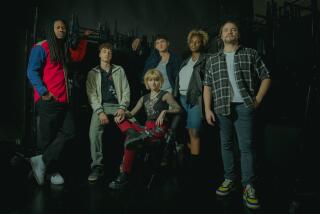AN OPEN HEARING
- Share via
Opponents of cochlear implants argue that the devices will prevent otherwise deaf people from developing a cultural identity linked to the use of sign language in the deaf community (“Sound and Fury,” by Michael D’Antonio, Nov. 21). So what! The development of a child’s sense of self depends on many diverse factors: moral and/or religious upbringing, ethnicity, nationality and more.
So deaf persons who gain the ability to hear do not lose their sense of who they are, unless they irrationally choose to define their whole selves in terms of their deafness. Compared to the benefit of being able to hear a Beethoven symphony or a Beatles ballad, a parent’s comforting voice or the lulling sound of crickets on a lazy summer night, the loss of cultural identification with those who forsake the world of sound is minimal.
The opponents of implants understandably fear that their inherently valuable culture of deafness will disappear with the widespread use of these devices, something to be lamented if it happens. But insisting that the world they so proudly reject should not be opened to others is just a form of cultural Philistinism.
SAMUEL C. RICKLESS
Los Angeles
*
When any group decides it knows what is best for all of its members and makes up exclusive rules for belonging or not belonging, that group’s integrity must be questioned. With their staunch opposition, not only to technology but to differences in ability within the deaf community as well, these missionaries may be propagating the very bigotry they despise.
MELANIE OTEY
Los Angeles
*
Many deaf people will never find any solace in a deaf culture. Many want to experience a number of life’s options as are open to them, including the ability to hear and speak.
The deaf community does not welcome all deaf people (one has to follow their rules and speak their language). Many parents do not want to give up their child to residential schooling and a separate “culture.” Not all deaf people have the same agenda as those who make a living from the deaf-community organizations, including people who can hear (such as Harlan Lane, who speaks out in behalf of those who cannot hear, though he himself is not deaf).
Without my cochlear implant, I am deaf. With it, I enjoy conversation, music and life in a world of sound. No one should have the power to prevent others from having a chance to hear.
JOANNE SYRJA
San Francisco
*
There already exists a sizable portion of the deaf community that relies on spoken language as its primary mode of communication. Those who follow an auditory/oral approach to language development have been and continue to be part of the wonderful diversity that until recently has characterized the deaf community.
It is these individuals, not those reared in a sign-language environment, who are embracing the cochlear implant in ever-increasing numbers. Unfortunately, not one of these thousands of individuals were cited in the article to provide their invaluable insights and experiences.
These people have not felt a compelling need to label themselves as a separate and distinct cultural minority. They have already been exposed to the one-size-fits-all philosophy advanced by the deaf isolationists and have soundly rejected it.
RICK APICELLA
Oyster Bay, N.Y.
*
What a sense of physical invincibility members of the National Association of the Deaf must enjoy. They don’t want deaf children to have cochlear implants because they think sign language alone is better.
Don’t these people know that many people eventually lose their sight and/or manual dexterity? For example, my once quick and nimble hands are now ruined by multiple sclerosis. As wonderful as sign language is, it works only as long as a signer has good eyes and hands. We should be thankful that sign language can now be supplemented by implants.
KATHRYN LINDSKOOG
Orange
*
Surely, the elevation of handicap to a blessing has never reached such hysterical heights. Hearing, sight, the ability to run to catch a Frisbee--all are superior to deafness, blindness and the tragic afflictions that can compromise a person’s movement and ability to breathe. There are a few easy absolutes in this world.
PAUL L. EHRMANN
Santa Monica
*
Helen Keller was not deaf and blind from birth, as was stated, but became so as a result of a high fever at about 18 months of age.
Also, although people have a right to be proud of their accomplishments, being deaf is not an accomplishment--any more than being short, left-handed, gay or African American is. Nor are these things to be ashamed of; it’s just the way things are, and there’s usually nothing one can do to change them.
Many in deaf society don’t seem to agree. When the students and faculty at Gallaudet reacted to the appointment of a non-signing, hearing person to be their new president, they gained my admiration. When they later insisted that all future presidents be deaf, they lost it.
While sign language can admit one to deaf society, it cannot alone gain one admittance into greater society. Relying solely on signing limits one severely. Anyone who says that hearing parents should not have the last word on whether their deaf children get implants are arguing for restricting these children to a limited life.
DAVID R. MOORE
Fillmore
*
D’Antonio’s article did a grave injustice to parents everywhere who have agonized over making a cochlear implant decision for their children.
If the deaf community truly advocates choice, it will realize that without the implant there is no choice: The child is resigned to deafness. If an implant is chosen and proves unsuccessful, however, the deaf community then becomes another option, along with oralism. Children eventually may choose to not wear the implant’s external parts (rendering them deaf) and decide to follow the deaf cultural lifestyle. But having the implant first will give them the advantages of biculturalism and the potential to function in both worlds.
If the deaf celebrate when their children are born deaf, do they grieve when their child is born hearing? Hearing parents rejoice to learn that their child was born without disabilities--and weep for a child born deaf.
CAMILLE JONES, PRESIDENT
COCHLEAR IMPLANT CLUB INT’L.
Los Angeles


